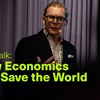economic

Ethics and economics
This project will try to build and test a model that includes dutifulness and contracting, as a way of studying the tension between what is best for the individual and what is best for the group.

How economics can save the world
Book launch for How Economics Can Save the World (Penguin, 2023) by Erik Angner, professor of practical philosophy and PhD in economics. Economics has always been shadowed by a movement that has been c
Symposium on the ethics of economic ordeals: Introduction
Economics and Philosophy 37 Abstract Economic ordeals are allocation mechanisms that impose non-financial ‘deadweight costs to qualify for a transfer’ (Nichols and Zeckhauser 1982: 372). Examples include
Natural Selection and the Origin of Economic Growth
This paper develops an evolutionary growth theory that captures the interplay between the evolution of mankind and economic growth since the emergence of the human species. It argues that the transiti
Health as a Factor in Regional Economic Development
The health of the European workforce is a crucial issue as the share of old age people as well as the mean age increases, moreover the interest in the relation between health and productivity of busin
Social, sexual and economic networks of prostitution
2012. Leonardo45: 80-81.
EU Economic Growth and the Age Structure of the Population
2009. Economic Change and Restructuring, 42(3), 159-187. Online October 2008.
Final conference of the Franco-Swedish Program for Philosophy and Economics
The Franco-Swedish Program for Philosophy and Economics will arrange a final conference in Uppsala where a group of prominent philosophers and economists will meet to discuss issues at the border betw
Swedish Economic Growth and Education Since 1800
2008. Canadian Journal of Economics 41(1), February, 166-185.
Completed: Foundations of Behavioral Economics and the Nudge Agenda
This project will examine what behavioral economics and the nudge agenda are, to get a better understanding of contemporary economics and where it is heading.








